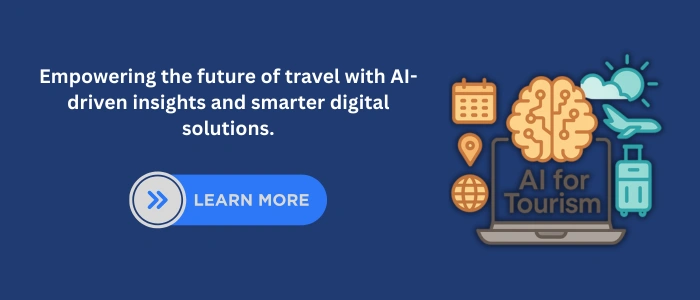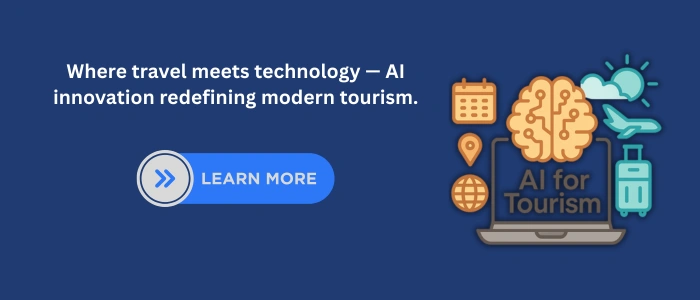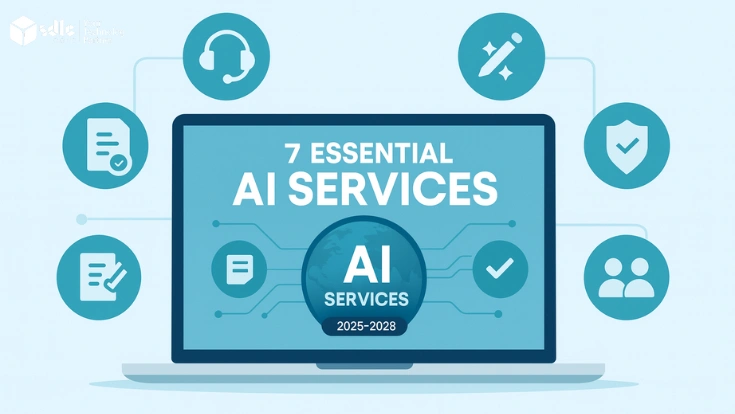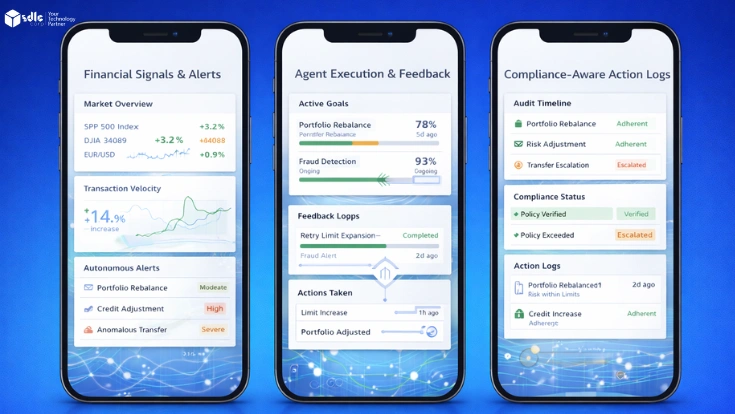Introduction
Artificial intelligence in tourism is transforming the global travel industry. From chatbots that manage bookings to predictive systems that anticipate customer behavior, AI has become essential for businesses aiming to deliver personalized, efficient, and seamless travel experiences.
Tourists today expect quick service, tailored recommendations, and 24/7 assistance. AI delivers on all these fronts. It simplifies complex processes like itinerary planning, pricing analysis, and real-time travel updates. As companies adopt AI travel technology, they’re unlocking new opportunities to enhance guest satisfaction, operational accuracy, and overall business performance.
With automation, analytics, and smart tourism systems working together, the future of tourism looks more connected, sustainable, and customer-driven than ever before.
The Role of Artificial Intelligence in Modern Tourism

AI is at the core of digital transformation in tourism. It drives improvements in marketing, logistics, and guest engagement while reducing manual workloads.
Businesses use smart tourism solutions to analyze customer data and predict travel patterns. For instance, hotels can forecast occupancy, airlines can optimize ticket pricing, and travel agencies can track destination popularity trends.
By integrating AI-driven tools:
- Repetitive administrative tasks are automated.
- Travelers receive timely, personalized communication.
- Businesses can respond faster to demand shifts.
Tourism professionals also benefit from predictive insights. AI helps them understand what customers want before they even ask, enabling smarter business decisions that improve retention and profit margins.
Learn more about AI Development Services to explore how AI is reshaping modern tourism systems.
Key Applications of AI in Tourism
AI is redefining how travel businesses operate and interact with customers. Below are the most impactful areas where artificial intelligence is driving real change.
AI Chatbots for Travel Customer Service

AI chatbots are now a must-have for travel companies. They provide instant responses to customer queries—covering bookings, cancellations, flight updates, and more.
Benefits include:
- 24/7 availability: Travelers can access support at any time.
- Multilingual support: AI chatbots for travel customer service eliminate language barriers.
- Data collection: Every interaction provides valuable insights for improving services.
Chatbots not only reduce response times but also create consistent experiences that strengthen brand reliability.
Predictive Analytics in Tourism

Predictive analytics in tourism enables companies to anticipate traveler preferences and market trends with precision.
Here’s how predictive models help:
- Identify peak booking seasons.
- Forecast customer spending and travel patterns.
- Optimize promotional strategies.
- Improve revenue management through smart pricing.
For example, airlines adjust fares dynamically, while hotels manage room inventory more efficiently maximizing occupancy and profit.
Virtual Tours Using AI

Virtual tours using AI allow potential travelers to explore destinations before they decide.
These AI-driven virtual experiences provide:
- 360° interactive visuals of hotels, attractions, and heritage sites.
- Immersive destination previews that enhance traveler confidence.
- Higher engagement rates and improved booking conversions.
By combining realism with accessibility, virtual tours create memorable pre-travel experiences that influence customer decisions.
Discover our Custom AI Integration Services to see how predictive and immersive solutions enhance the tourism experience.
Smart Tourism Solutions for a Connected Future
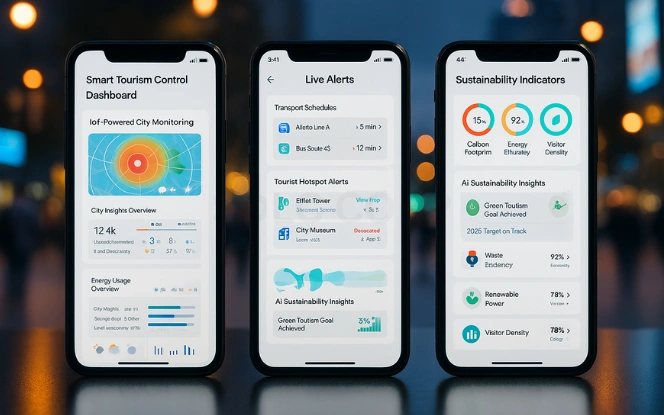
Smart tourism solutions combine AI, IoT, and data analytics to create connected travel ecosystems. These solutions enhance both the traveler’s journey and operational efficiency.
Why Smart Tourism Matters
Tourism is evolving into an intelligent, interconnected system. Smart platforms manage resources dynamically and improve sustainability.
Applications include:
Location-based AI guidance: Travelers receive live updates about attractions, events, or transport schedules.
Smart infrastructure: Cities use IoT sensors and AI analytics to guide tourists efficiently.
Energy management: Hotels use AI to control lighting and temperature automatically.
Safety monitoring: Predictive models assess potential disruptions such as bad weather or emergencies.
By integrating these systems, destinations become smarter and more sustainable. Tourists enjoy comfort, and operators benefit from efficient management.
Explore Generative AI for Tourism to understand how SDLC Corp helps cities and travel enterprises enable smarter, connected tourism.
Enhancing Traveler Experience Through AI Travel Technology
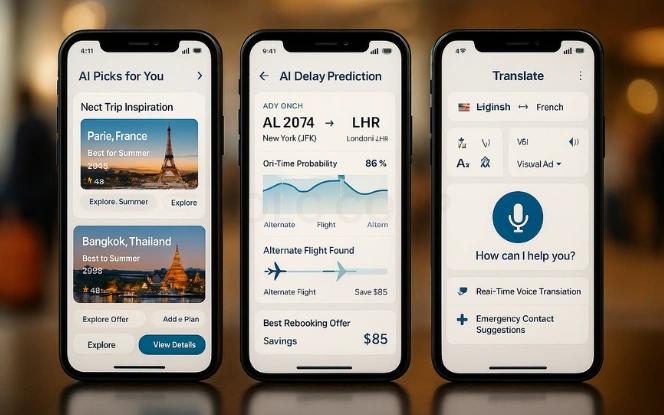
AI travel technology enhances experiences throughout the traveler’s journey—search, booking, and stay. It personalizes interactions and simplifies complex decisions.
Airlines use AI to predict delays and recommend alternate routes. Hotels analyze guest feedback to offer personalized room settings or amenities. Even digital assistants help travelers translate languages or locate nearby attractions.
For travelers with accessibility needs, AI offers features like voice control and route suggestions. This inclusivity strengthens a brand’s image while improving customer satisfaction.
Transitioning to AI allows businesses to automate repetitive tasks and focus on service quality, ensuring travelers feel valued and understood.
Operational Efficiency and Decision-Making with AI
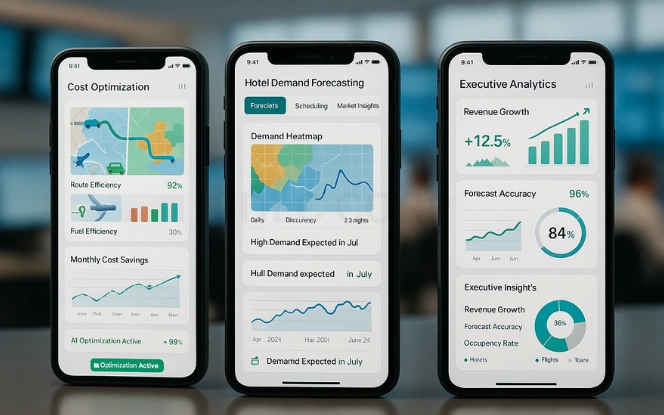
AI plays a crucial role in helping tourism businesses manage complex operations efficiently. It enables faster decision-making through real-time analytics and automation.
How AI Improves Operations
Automated scheduling: AI systems adjust bookings and itineraries instantly in case of delays.
Inventory management: Hotels predict demand and prevent overbooking using machine learning.
Cost optimization: Airlines use AI to plan efficient routes and reduce fuel consumption.
Strategic forecasting: Businesses can visualize market trends, traveler demographics, and revenue growth opportunities.
These capabilities reduce manual workload, improve accuracy, and lower costs. With better decision-making comes greater scalability and profitability.
Explore AI Business Intelligence Services to learn how SDLC Corp empowers data-driven tourism operations.
Ethical and Security Considerations in AI for Tourism
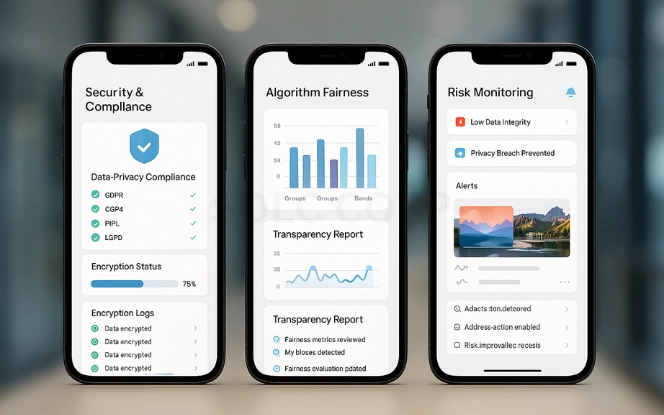
Ethical responsibility and data security are central to sustainable AI adoption in tourism. As travelers share sensitive details, preferences, payments, and travel routes, transparency becomes critical.
Tourism organizations must:
- Implement strict data protection measures.
- Avoid algorithmic bias in recommendation systems.
- Communicate clearly about data usage policies.
Responsible AI strengthens customer trust. When travelers know their data is handled securely, they’re more likely to engage with digital platforms confidently.
Learn how SDLC Corp ensures safe and transparent AI solutions through Responsible AI Development Practices.
The Future of AI in Global Tourism

The tourism industry’s future lies in deeper personalization, automation, and predictive intelligence. AI continues to redefine how travelers plan, book, and experience journeys.
Emerging trends include:
- AI-powered sustainability monitoring for eco-conscious travel.
- Autonomous planning tools that instantly create complete itineraries.
- Integration of AR/VR with AI to deliver immersive travel previews.
- Wider access to affordable AI tools for small and mid-sized operators.
As these innovations grow, the tourism ecosystem will become more inclusive and intelligent. Businesses adopting AI early will lead in innovation and customer satisfaction.
Conclusion
Artificial intelligence is revolutionizing every part of the tourism journey—from planning to experience delivery. Companies using AI travel technology are not only meeting customer expectations but also setting new standards for the industry.
Whether through smart tourism solutions, predictive analytics, or AI chatbots for travel customer service, AI ensures faster, smarter, and more efficient operations.
Businesses that adopt AI-driven systems now will stay ahead in a rapidly evolving market. To transform your travel business with AI, Contact us SDLC Corp and AI Consulting Services with SDLC Corp to build robust, future-ready solutions for global tourism success.
FAQs
How Is Artificial Intelligence Used in the Tourism Industry?
AI is used in data analytics, automation, and customer service chatbots. It enhances personalization, forecasting, and overall travel efficiency.
What Are the Benefits of AI Chatbots for Travel Customer Service?
AI chatbots for travel customer service improve response times, handle multi-language queries, and offer round-the-clock support.
How Does Predictive Analytics in Tourism Help Businesses?
Predictive analytics in tourism helps forecast demand, manage pricing, and identify trends for better resource planning.
What Are Virtual Tours Using AI, and Why Are They Important?
Virtual tours using AI allow travelers to explore destinations digitally, increasing engagement and confidence before booking.
Why Should Travel Businesses Invest in Smart Tourism Solutions?
Smart tourism solutions enhance efficiency, improve visitor experience, and support data-driven decision-making across travel operations.

